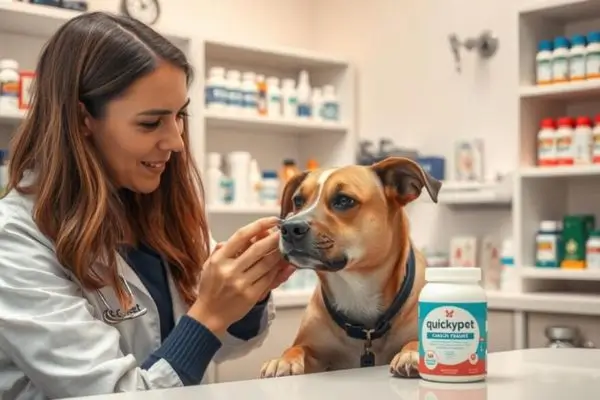Dog Coughing ? Common Causes and What You Should Know
Is your dog’s cough worrying you? Dogs cough for many reasons, from simple colds to serious lung problems. Knowing why your dog coughs and when to see a vet is key. But what are the main reasons dogs cough, and when should you worry?
Key Takeaways
- Dog coughing can be caused by a range of respiratory issues, from infections to allergies.
- Recognizing the type of cough and accompanying symptoms is crucial in determining the underlying cause.
- Persistent or recurrent coughing may indicate a more serious health condition that requires prompt veterinary attention.
- Identifying and managing environmental triggers can help alleviate certain types of dog coughing.
- Seeking timely veterinary care is important to ensure proper diagnosis and treatment for your canine companion.
Understanding Dog Coughing Symptoms and Signs
Dog coughs can vary, each with its own cause. Dry coughs might mean dog hacking cough or tracheal collapse. Wet coughs could point to pneumonia or heart disease. A honking sound is often a sign of tracheal collapse, common in small dogs.
Different Types of Dog Coughs
- Dry, hacking coughs are linked to conditions like dog hacking cough, kennel cough, or tracheal collapse.
- Wet, productive coughs may suggest pneumonia, heart disease, or dog wet cough.
- A honking cough is often a symptom of tracheal collapse.
When Coughing Becomes a Concern
Coughing is a worry if it lasts, gets worse with exercise, or comes with other bad signs. Look out for tiredness, fever, dog wheezing, or trouble breathing. The type, how long, and how often your dog coughs matters, along with any other symptoms.
Common Accompanying Symptoms
Watch for signs like nasal discharge, loss of appetite, and shortness of breath. These clues help figure out what’s wrong and guide the vet’s check-up.
| Symptom | Potential Cause |
|---|---|
| Dog dry cough | Kennel cough, tracheal collapse |
| Dog wet cough | Pneumonia, heart disease |
| Dog wheezing | Allergies, asthma, respiratory infection |
| Nasal discharge | Respiratory infection, allergies |
| Loss of appetite | Illness, pain, stress |
| Shortness of breath | Heart disease, lung disease, obesity |
Knowing about dog coughs and their symptoms helps owners know when to see a vet. Keeping an eye on your dog’s breathing is key to their health.
Respiratory Infections and Dog Coughing
Dog respiratory infections can come from viruses, bacteria, fungi, and parasites. These infections can hit the upper respiratory tract, lung tissue, or airways. Symptoms include coughing, sneezing, fever, and nasal discharge.
The canine influenza virus is a common cause of respiratory infections in dogs. It leads to symptoms like persistent coughing, fever, and nasal discharge. Lungworms can also cause coughing in dogs, though less often than heartworms.
Some dogs with respiratory infections can get very sick quickly, within 1-3 days. But others might only show mild symptoms. Labs across the country are testing samples to find new causes of these diseases.
Treatment for dog respiratory infections depends on the cause. It might include supportive care, antibiotics for bacteria, and deworming for parasites. If your dog is showing signs of respiratory distress, get them to the vet fast.
| Respiratory Infection | Symptoms | Treatment |
|---|---|---|
| Canine Influenza | Persistent coughing, fever, nasal discharge | Supportive care, antiviral medications |
| Lungworms | Coughing, difficulty breathing | Deworming medications |
| Bacterial Infections | Coughing, sneezing, nasal discharge, fever | Antibiotics, supportive care |
Pet owners need to watch for signs of dog respiratory infections and act fast if they see them. Early treatment is key to keeping your pet healthy.
Kennel Cough: A Common Culprit
Dog owners know the hacking cough that means kennel cough, or tracheobronchitis, has started. This contagious infection is a top reason for coughing in dogs. The Bordetella bacterium is usually to blame.
Symptoms of Kennel Cough
The main sign of kennel cough is a dry, persistent cough. It might be followed by retching or gagging. Dogs may also have a runny nose, sneeze, feel tired, lose their appetite, and have a low fever.
In serious cases, dogs might breathe differently or sound different when they bark.
Treatment Options
Kennel cough usually gets better with rest and time. But sometimes, vets might give antibiotics or cough medicines. These help ease symptoms and stop other infections.
Drinking lots of water and staying in a quiet, calm place also helps your dog get better.
Prevention Methods
- Make sure your dog’s vaccinations, including the Bordetella vaccine, are current.
- Stay away from crowded places like dog parks, kennels, or daycare during outbreaks.
- Clean and disinfect your dog’s area often to stop the spread of bacteria.
- Keep your dog away from other dogs that might have kennel cough.
Knowing about kennel cough symptoms, treatments, and how to prevent it helps keep your dog healthy. If you see any worrying signs, talk to your vet for advice and care.
Heart Disease and Related Coughing Issues
Dog coughing might not always be due to infections or the environment. Sometimes, heart disease is the real cause. Issues like mitral valve endocardiosis, dilated cardiomyopathy, and congestive heart failure can make dogs cough a lot.
Coughing from heart disease often gets worse at night or when dogs are resting. As the disease gets worse, the cough gets louder. You might also see signs like trouble breathing, feeling very tired, and fluid in the belly or lungs.
| Symptom | Potential Cause |
|---|---|
| Coughing, especially at night | Mitral valve disease, dilated cardiomyopathy, congestive heart failure |
| Difficulty breathing, fatigue | Fluid buildup in the lungs (left-sided congestive heart failure) |
| Abdominal swelling | Fluid buildup in the abdomen (right-sided congestive heart failure) |
Treating heart-related coughing might need medicines to help the heart work better. These can include drugs to control blood pressure and reduce fluid. Sometimes, surgery or a pacemaker is needed. Regular vet visits are key to catch and manage these problems early.
If your dog is coughing and you think it might be heart-related, see your vet. With the right treatment, many dogs with dog heart disease or congestive heart failure in dogs can live happy, healthy lives despite their dog cough heart problems.
Environmental Factors and Allergies
If your dog keeps coughing, it might be due to environmental allergies. These allergies are common in dogs, often showing up after they’re six months old. They can affect most dogs over one or two years old.
While food allergies affect 10-15% of dogs, environmental allergens are more common. This means your dog might be reacting to things like pollen, dust mites, or mold spores.
Common Allergens
Dogs can be sensitive to many things in their environment. This includes pollen, dust mites, mold spores, and even certain fabrics or perfumes. Flea Allergy Dermatitis (FAD) is a common allergy in dogs, caused by an allergic reaction to flea saliva.
These allergens can cause inflammation in your dog’s airways and lungs. This inflammation can lead to persistent coughing.
Managing Environmental Triggers
- Use air purifiers and humidifiers to improve indoor air quality.
- Vacuum and clean regularly to minimize dust and dander buildup.
- Avoid exposing your dog to strong scents, chemicals, and smoke.
- Consider switching to hypoallergenic products, such as pet-safe cleaning solutions.
- Regularly bathe and groom your dog to reduce environmental allergens.
- Work with your veterinarian to identify and eliminate specific allergens from your dog’s environment.
Managing allergies is key to keeping your dog comfortable. There’s no single solution for all dogs. But, a mix of environmental controls and vet-recommended treatments can help reduce coughing caused by allergies.
Tracheal Collapse and Chronic Bronchitis
If your dog has a persistent cough, it might be due to tracheal collapse or chronic bronchitis. These conditions are serious but treatable. Knowing the causes and treatments can help you care for your dog better.
Tracheal Collapse: A Common Issue in Small Breeds
Tracheal collapse is common in small dogs like Pomeranians and Chihuahuas. It causes a “honking” cough, especially when they’re excited or active.
Chronic Bronchitis: Inflammation of the Airways
Chronic bronchitis is a long-term inflammation of the airways. It leads to a dry, hacking cough that gets worse with activity. It can affect any dog, but is more common in older dogs.
Diagnosing and Treating Tracheal Collapse and Chronic Bronchitis
Your vet may use X-rays or a tracheoscopy to diagnose these conditions. For dog tracheal collapse, they might prescribe medications to open airways and reduce coughing. For chronic bronchitis in dogs, they might use inhaled medications like fluticasone.
Changing your dog’s environment can also help. Use air purifiers and avoid irritants. Keeping your dog at a healthy weight and using a harness instead of a collar can also help.
If your dog has a dog chronic cough, see a vet. They can find the cause and treat it. With the right care, many dogs can live well with these conditions.

Foreign Objects and Emergency Situations
Dogs are naturally curious and love to explore with their mouths. This can sometimes lead to dangerous situations. Swallowing small objects like toys, bones, or food can cause choking and breathing problems. It’s very important to act fast and right to keep your dog safe.
Identifying Choking Hazards
There are many things that can be choking hazards for dogs. These include:
- Small toys that can break into pieces
- Bones, especially cooked or brittle ones
- Food items like corn cobs, skewers, and fruit pits
- Other household items like wrappers, clothing, and BBQ leftovers
It’s important to watch your dog closely, especially when they’re playing or eating. This can help prevent accidents.
Emergency Response Steps
If you think your dog is choking, stay calm and follow these steps:
- Look in your dog’s mouth for the object. If you see it and can safely take it out, do so carefully.
- If you can’t see the object or can’t take it out, try the Heimlich maneuver for dogs. Stand behind your pet, put your fist just below their rib cage, and push five times hard.
- If your dog is still having trouble breathing, get them to a vet right away. Time is very important in a choking emergency.
Dogs can also swallow things that can block their bowels, causing more health problems. If you think your dog swallowed something dangerous, get them to a vet fast.
Preventing problems is the best way to keep your dog safe. Watch them during play, keep trash cans closed, and teach others not to give them table scraps. By being careful and knowing what to do in an emergency, you can help keep your dog healthy and safe.
Serious Medical Conditions Causing Dog Coughing
A cough in dogs might seem minor, but it can hide serious health issues. Canine distemper virus, pulmonary hypertension, and certain cancers can cause persistent or severe coughing.
Canine Distemper: This contagious and deadly virus causes coughing, fever, and neurological problems. Quick vet care is key to managing it.
Pulmonary Hypertension: This heart disease leads to coughing, fainting, and heart failure. Dogs need prompt diagnosis and ongoing care.
Lung Cancer and Metastatic Cancers: Lung or respiratory cancers can also cause coughing. These need specialized vet care and treatment.
If your dog’s cough doesn’t go away or gets worse, see a vet fast. Early treatment can improve your dog’s life and health.
dog coughing can be a sign of something more serious, so it’s important to pay attention to the frequency, duration, and severity of the cough and discuss it with your veterinarian.”
Treatment Options and Medications
When your dog coughs, the treatment depends on the cause. Your vet might give different meds. These can be antibiotics, anti-inflammatory drugs, or cough suppressants. For heart disease, they might suggest pimobendan, ACE inhibitors, or diuretics.
Prescription Medications
Prescription meds can tackle the main problem. Antibiotics fight bacterial infections. Anti-inflammatory drugs reduce swelling in airways. Bronchodilators open airways, and cough suppressants stop persistent coughing.
Always follow your vet’s advice and watch your dog closely with meds. Look out for side effects like nausea, diarrhea, and drowsiness.
Natural Remedies
Natural remedies can also help your dog’s cough. Honey soothes the throat and cuts down coughing. Steam therapy loosens mucus, making it easier to cough up.
Herbs like slippery elm and licorice root might help too. But, talk to your vet before using them. They could interact with your dog’s meds or have side effects.
“Always work closely with your veterinarian to determine the best treatment plan for your dog’s cough. They can help ensure the safety and effectiveness of any medications or natural remedies.”

Prevention Strategies and Lifestyle Changes
Preventing dog coughing requires a mix of medical care and lifestyle changes. Regular vaccinations protect your dog from diseases like kennel cough and distemper. These diseases can cause persistent coughing.
Keeping your dog at a healthy weight and exercising them regularly also helps. This supports their respiratory health and lowers coughing risks.
To avoid dog coughing, limit exposure to harmful substances like smoke and strong smells. Using a harness instead of a collar is also key. This is especially true for breeds like Pomeranians, Pugs, and Yorkshire Terriers, which are more prone to respiratory problems.
Regular vet visits are vital for catching health issues early. Your vet can offer advice on dog health maintenance and lifestyle changes to prevent dog coughing. This ensures your dog stays healthy and happy.
| Breed | Tracheal Collapse Prevalence | Average Cost of Surgical Correction |
|---|---|---|
| Pomeranian | High | $2,000 – $6,500 |
| Pug | High | $2,000 – $6,500 |
| Toy Poodle | High | $2,000 – $6,500 |
| Shih Tzu | High | $2,000 – $6,500 |
| Chihuahua | High | $2,000 – $6,500 |
| Lhasa Apso | High | $2,000 – $6,500 |
| Yorkshire Terrier | High | $2,000 – $6,500 |
By following these prevention strategies and lifestyle changes, you can greatly lower your dog’s risk of coughing. This helps keep their respiratory health in top shape.
When to Seek Veterinary Care
If your dog’s cough lasts more than a few days or gets worse, it’s time to see a vet. A long-lasting cough might mean there’s a health problem that needs attention. Also, if your dog has trouble breathing, seems very tired, or doesn’t want to eat, get them to a vet fast.
Emergency Warning Signs
Some coughs in dogs are serious and need quick help. Look out for severe coughing, blue gums, or if they collapse. If you see these signs, call your vet or go to an emergency clinic right away.
Diagnostic Procedures
When you take your dog to the vet, they might do some tests. This could be a physical check, blood tests, chest X-rays, or even CT scans or echocardiograms. These help find out why your dog is coughing.
Seeing a vet early is key to finding and treating the cause of your dog’s cough. Your vet can help your dog feel better and stop the cough from getting worse.
Conclusion
It’s important to know why dogs cough and the different types of coughs. Some coughs are minor and go away on their own. But others can be serious health issues.
Regular vet visits and a healthy lifestyle are key. Paying attention to your dog’s breathing is also crucial. This helps manage and prevent coughing problems.
Being informed and proactive helps keep your dog’s lungs healthy. If your dog coughs a lot or coughs up stuff, get vet help fast. This can really help your dog feel better.
Looking after your dog’s breathing is your job as a pet owner. Stay alert, learn about dog health, and work with your vet. This way, you can help your dog stay happy and healthy.







